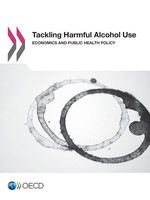Landmark report from OECD recommends evidence-based alcohol policies
“Even expensive alcohol prevention policies are cost-effective in the long run and underlines the need for urgent action by governments”, commented OECD Secretary-General Angel Gurría when OECD launched their new alcohol report.
“The cost to society and the economy of excessive alcohol consumption around the world is massive, especially in OECD countries,” said OECD Secretary-General Angel Gurría at the launch event in Paris. The new OECD report, titled Tackling Harmful Alcohol Use: Economics and Public Health Policy, is briefly introduced in this video. The presentation starts with the slogan “Better Policies for Better Lives”.
The OECD report points at several policies that have the potential to reduce heavy drinking, regular or episodic, as well as alcohol dependence. Governments seeking to tackle binge drinking and other types of alcohol problems have a menu of policies to choose from, interventions that have proven to be effective. This includes counselling heavy drinkers, stepping up enforcement of drinking-and-driving laws, as well as raising taxes, raising prices, and increasing the regulation of the marketing of alcoholic drinks.
The full report is available at the OECD web site here.
The report takes note of the fact that drinking is on the rise among young people and women in many OECD countries, partly due to alcohol becoming more available, more affordable and more effectively advertised. Europe is the heavy drinking region of the world with a consumption level which is almost the double of the global average. The average drinker in Europe consumes around 10 liters of pure alcohol per year, compared to the global average which is a little above 6 liters, according to WHO data.
Mariann Skar, Secretary General of the European Alcohol Policy Alliance, comments: “OECD has presented a strong message to European Governments, the European Commission and the public health community. Even the most expensive interventions like health care and work place interventions are cost-effective and will give both an economic and health benefit when implemented. Most alcohol policies are not expensive to implement and leads to great health and economic benefits. Furthermore, the report shows the importance of addressing broad policy approaches such as price and marketing in addition to policies addressing only the ones who drink most”.
See more of Europcare’s comments here.
The OEDC Seretary-General Gurría recalls the launch of OECD’s report on obesity five years ago - Fit not Fat: “I recall the surprise among many people that an organisation with the word ‘economic’ in its title was addressing an issue such as obesity. But today no-one doubts that obesity poses a threat to our health systems. The same is true of harmful alcohol consumption. Binge drinking and heavy drinking carry devastating personal and social consequences, they increase health spending and reduce our standard of living. Through efforts such as this report, the OECD will continue to help countries identify the most promising ways of tackling this problem and promote better policies for better, healthier lives
“The harms caused to people other than drinkers themselves, including the victims of traffic accidents and violence, but also children born with foetal alcohol spectrum disorders, are the most visible face of those social consequences. Health care and crime costs, and lost productivity, are further important dimensions. These provide a strong rationale for governments to take action against harmful alcohol use”, says the Executive Summary of the OECD Report 2015.

